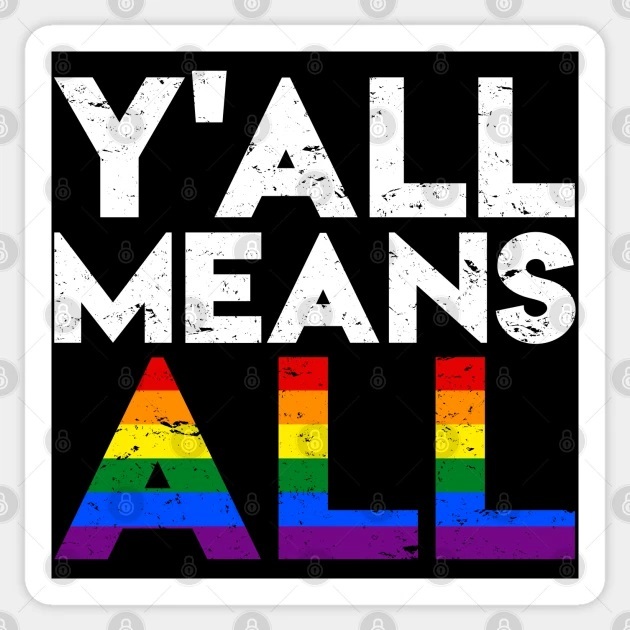Y’all: It’s a word that immediately locates one in a dialect, that embraces and includes at the same time as it may implicitly push back. “Y’all” is a second person plural pronoun, meaning it’s used to address two or more people. It’s one of the few English words that fills this grammatical niche, ever since the plural and singular second person pronouns (thou and ye, descended from the Old English þu and ge) collapsed in Early Modern English. When the distinction became one of formality rather than number, our language lost an essential functional word. Originating across the 19th-century South, “y’all” is the modern word best occupied to fill that niche; it lacks the uncomfortable gendering of “you guys” and the clumsiness of “everyone,” and lends itself delightfully to couple with auxiliary verbs for further contractions (y’all’ve, y’all’s, y’ain’t, y’all’re). It’s native to many dialects of the American South and Appalachia, and in recent years has spread into the linguistic mainstream.
I was about six or seven when I realized that we spoke differently. My mom, a teacher of dyslexic students, kept my attention on language and pronunciation growing up, and from about the age of ten I consciously tried to change the way I spoke to sound less like my family and more like people on TV. I already didn’t feel like I “fit” with/in my “heritage”; even before I knew I was queer, I knew I was different—and if there were other people like me, they weren’t in the South, I was sure. I had to get out, and I didn’t want to take any of it with me—I didn’t want to be identified as from that place, where people were stupid and backwards. From my lips and teeth and tongue, I excised my heritage as thoroughly as I was able to, starting with that insidious Southern slang: “y’all.” In my formative years I was fiercely anti-y’all, painstakingly typing out “you all” in text messages and correcting my friends as much as I could get away with, on a single-person crusade to rid this little bubble of Alabama of a key Southern signifier. This is not a unique experience—many Americans feel similar, and darker social pressure to alter their speech to conform (though none of us should).
Years later, after practice formed a strong habit and my speech was as General American professional as I could hope, the double-edged sword that carved out my accent showed itself. A linguistics professor in undergrad loaned me a book on linguistic bias, and I realized that internalized bias against a Southern or “country” accent coerced me into reshaping my speech. There was nothing wrong with the way I had grown up speaking. There was something wrong in the pressure I felt to abandon my native drawl. Slowly and (self-)consciously, I reintroduced that essential word into my vocabulary, intentionally using it (and feeling strange as I did). Now, it’s automatic—I say y’all every day, and I don’t hate myself for it. In fact, I say my “y’all”s with glee.
Recently, “y’all” has expanded not only lexically but socially, as stickers and flags patterned with “y’all means all” have vibrantly pushed back against the anti-LGBTQ+ maneuvers of Southern state legislatures. “Y’all means all” connects an intrinsically Southern signpost with queer acceptance and enacts the famous hospitality the South has historically been stingy with. The “y’all means all” slogan, recent though it is, provides a Southern queer like me with a sense of belonging in my own space, in my own history—a welcoming to my true self from my hometown that I’d never thought to receive.
Having pushed myself out of heritage, seeking for something to belong to somewhere else, it’s hard to get it back. I can never retrieve the Southern accent that I stamped out, that I never really grew into enough for it to stick. But one word at a time, I can carve back a little of my discarded, shameful heritage for myself and know it, hold it as my own even as I push back against the worst of what the South represents.
I’m glad to have y’all. It’s a word that sounds like home.


